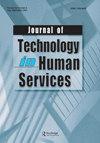A VR Client Simulation to Prepare MSW Social Work Students for Practicum: A Feasibility Study
IF 1.5
Q2 SOCIAL WORK
引用次数: 0
Abstract
Abstract In this feasibility study of virtual reality (VR)-based learning, we surveyed Master of Social Work students (n = 54) to examine student perceptions of a VR client simulation (VRCS) as a preparatory tool to work with real clients. The pre-post survey examined changes in students’ perceived anxiety, stress, excitement, competency, confidence and frustration to communicate and interact with a client. We also measured changes in students’ perceived interest toward working with older adults (70+) years. Wilcoxon signed-rank tests showed statistically significant decreases in participants perceived anxiety, stress, and frustration, and statistically significant increases in participants perceived competency, confidence, and excitement to interact with a future live client as part of their practicum placement requirements. There was a statistically significant increase in participants’ perceptions that practicing with a VRCS will transfer effectively to interacting with a real live client in the future. Results also showed statistically significant increases in participant’s perceived interest to work with older adults. Outcomes suggest a VRCS may complement other learning activities in a curricular program especially at the start as an experiential strategy to prepare students for practicum.虚拟现实客户端模拟为MSW社会工作学生实习做准备的可行性研究
摘要在这项基于虚拟现实(VR)的学习可行性研究中,我们调查了社会工作硕士学生(n = 54)来检查学生对虚拟现实客户端模拟(VRCS)的感知,作为与真实客户端合作的准备工具。这项前后调查考察了学生在与客户沟通和互动方面的焦虑、压力、兴奋、能力、信心和挫折感的变化。我们还测量了学生对与70岁以上的老年人一起工作的感知兴趣的变化。Wilcoxon签名等级测试显示,参与者感知到的焦虑、压力和挫折感在统计学上显著降低,而参与者感知到与未来直播客户互动的能力、信心和兴奋感在统计上显著增加,这是他们实习安置要求的一部分。从统计数据来看,参与者认为使用VRCS练习将有效地转移到未来与真实客户互动的看法显著增加。结果还显示,参与者对与老年人一起工作的兴趣在统计学上显著增加。结果表明,VRCS可以补充课程计划中的其他学习活动,尤其是在刚开始时,作为一种体验策略,为学生实习做准备。
本文章由计算机程序翻译,如有差异,请以英文原文为准。
求助全文
约1分钟内获得全文
求助全文
来源期刊

JOURNAL OF TECHNOLOGY IN HUMAN SERVICES
SOCIAL WORK-
CiteScore
4.20
自引率
6.70%
发文量
6
期刊介绍:
This peer-reviewed, refereed journal explores the potentials of computer and telecommunications technologies in mental health, developmental disability, welfare, addictions, education, and other human services. The Journal of Technology in Human Services covers the full range of technological applications, including direct service techniques. It not only provides the necessary historical perspectives on the use of computers in the human service field, but it also presents articles that will improve your technology literacy and keep you abreast of state-of-the-art developments.
 求助内容:
求助内容: 应助结果提醒方式:
应助结果提醒方式:


